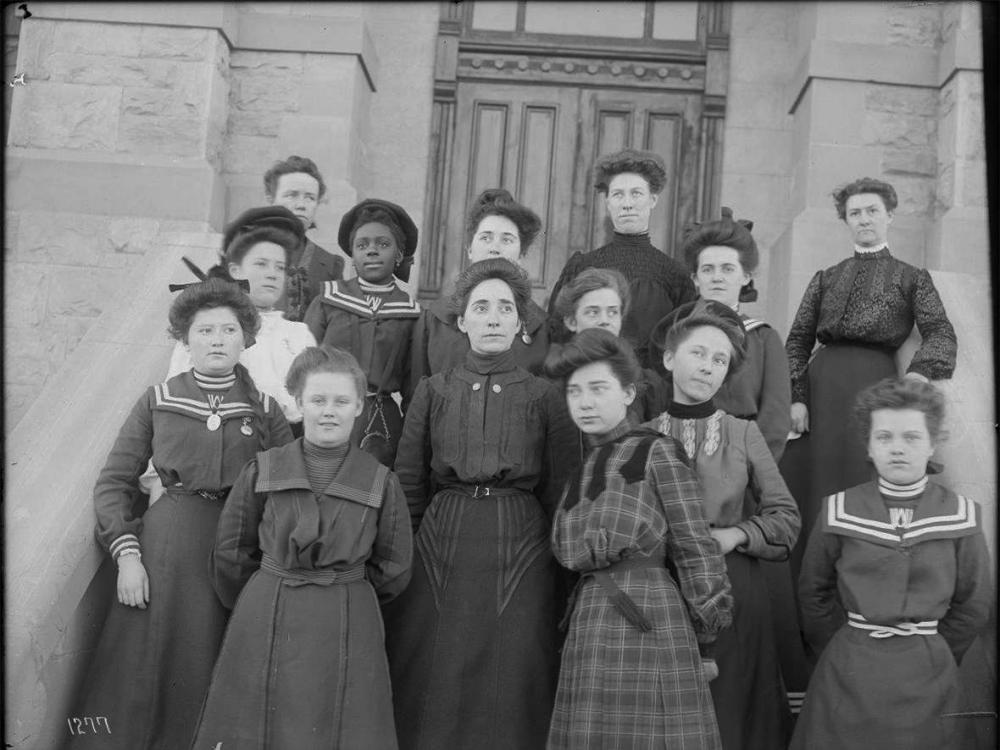Carrie Burton Overton beat all the odds and entered the University of Wyoming in 1903 at the age of 15 making her the first African American woman to attend U.W.
Carrie was raised by her mother and stepfather. Her mother, Katie, moved to the Wyoming Territory in 1887, and her stepfather, Tom Price, retired to the Territory after being discharged from the 9th Cavalry Regiment in 1876 (Viner, 2018). The 9th Cavalry was one of the original six regiments of the regular U.S. Army for black enlisted men (Schubert, 2011).
Like many states and territories during this time, Wyoming law permitted unequal or unfair treatment of some citizens, which included discrimination in housing and education, and outlawing interracial marriages. There were no professional African Americans in Laramie; instead, they were restricted to low-grade jobs: her mother Katie worked as a domestic and her stepfather Tom was a laborer. Because of their race, Carrie and her family were subjected to insults, and at times even teased. “They called me black, and I’d call them any name that I could find to call them and we’d be friends,” Carrie stated in an interview (Viner, 2018).
At a young age, Carrie was an excellent pianist and performed for several community events. Her love for music and talents opened up a world of opportunity for her future. Carrie completed her high school requirements at the University of Wyoming preparatory school. At the same time, she was also enrolled in the UW School of Commerce where she obtained a certificate in Stenography and the School of Music where she continued improving her piano skills.

After her four years at UW Carrie was accepted to Howard University in Washington D.C. To cover her cost of moving, a fundraising concert was sponsored by the wife of Laramie banker and philanthropist, Edward Ivinson. Carrie had trying times in Washington, the most significant was the loss of her stepfather, which forced Carrie’s mother to move to D.C. with her. In addition to school, Carrie had several jobs as a secretary and as a switchboard operator. It was said that during that time she worked and worried herself into sickness and was under a doctor's care.
With time, Washington became easier for Carrie. In 1913 she received a music diploma from Howard University and married her husband, George Overton. Carrie and George then moved to New York City where she continued her musical studies and received a diploma from the Juilliard School of Music in piano studies and musical theory. Carrie continued her academic studies by entering Columbia University where she was awarded both Bachelor’s and Master’s degrees. Throughout her adult life, Carrie was employed by the NAACP, and the Democratic National Committee, and the Community Church of New York City (Viner, 2018).
Although Carrie never lived in Laramie again, she still played a role in bettering the community. She raised funds for the Laramie Plains Museum and Ivinson Mansion. In a 1969 interview, Carrie said, “I have found there is no place like Laramie for good people. Everybody helped. Everybody in the town felt we were family.” Carrie Burton Overton gladly credited her success and accomplishments to the people of Laramie for the faith they had in her. Carrie Overton died in New York City in December 1975 at the age of 87. She should be remembered for the way she persevered in the face of early poverty and discrimination (Viner, 2018).
References:
Wyoming Women of Note is a series to celebrate Wyoming Women's Suffrage. New highlights will be released each month of this year. Please visit our current featured women here!